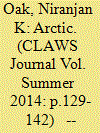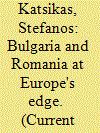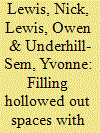|
|
|
Sort Order |
|
|
|
Items / Page
|
|
|
|
|
|
|
| Srl | Item |
| 1 |
ID:
131029


|
|
|
|
|
| Publication |
2014.
|
| Summary/Abstract |
Regionalism as a political project has been a signi?cant phenomenon in post-1945 international relations. The third phase of regional integration began towards the end of the 19805 within the international context created by the end of the Cold War. Academics dubbed it as "new regionalism".' Most of the regional organisations that came up in those days were based on economic cooperation among the states. It was an era of globalisation. The Arctic Council (AC) which emerged in 1996 was a unique case. The 'Arctic' has emerged as a region in international cooperation during the past 20-30 years, as manifest in the creation of the AC. The objective of the AC was sustainable development and environmental protection only, and that is why it may be termed as a unique case in that period.
|
|
|
|
|
|
|
|
|
|
|
|
|
|
|
|
| 2 |
ID:
129210


|
|
|
|
|
| Publication |
2014.
|
| Summary/Abstract |
Bulgaria and Romania joined the European Union as full member states on January 1, 2007. This momentous event was the culmination of a long and demanding political project that has often been described as "Europeanization." Although the foundations of this project were laid fairly soon after the fall of both countries' communist regimes in 1989, the pace was slow, and did not really gain momentum
until the end of the 1990s. Over the years the project ebbed and flowed, but what kept both nations committed was their strong belief that joining the EU would fill the political, economic, and security vacuum that the dissolution of the communist bloc had produced. EU membership was popularly seen as a panacea that would allow Bulgaria and Romania to stabilize their newborn democratic systems and overcome the economic problems of the postcommunist transition. It offered confirmation that the Bulgarians and Romanians were really Europeans. Seven years later, however, rather than feeling pulled into the heart of Europe, Bulgaria and Romania find themselves at the edge. Their EU partners raise questions about their commitment to the rule of law and their willingness to crack down on organized crime and illegal immigration. Does this mean that membership has not been an easy route to democratic stability, economic growth, and greater opportunity for all? European integration may be a difficult topic at a time when economic crisis has, for some, cast the entire effort into doubt. But the situation of Romania and Bulgaria lends itself to reflection on the wider project and its overall historical importance.
|
|
|
|
|
|
|
|
|
|
|
|
|
|
|
|
| 3 |
ID:
090016


|
|
|
|
|
| Publication |
2009.
|
| Summary/Abstract |
The contracting out to private providers of services previously delivered within the state has been framed critically as 'hollowing out' and read for its erosion of social democracy, social justice and welfare, as well as its inefficiencies in practice. It is commonly dismissed as neoliberalism. In this paper, we highlight the gains made through this new contractualism by Te Oranga, the Family, Health and Education division of Te Runanga o Te Rarawa located in the Far North of New Zealand. Our aim is not to narrate the exceptional, but to point to the inherent resistances to totalising projects residing in agency and place. Placed at the service of a deep sense of community being and community good rather than self-interest, delivery contracts have enabled Te Oranga to pursue an alternative form of local development and craft a set of progressive spaces. Although highly contingent upon powerful Maori political projects, we argue that the case suggests that gains may be sought in other settings, albeit partial, temporary, and politically contingent. We thus offer a more nuanced account of neoliberalism by highlighting its agency, fractures, politics, and contradictions, and by demonstrating that actualised neoliberalisms are co-constituted with other political projects.
|
|
|
|
|
|
|
|
|
|
|
|
|
|
|
|
|
|
|
|
|